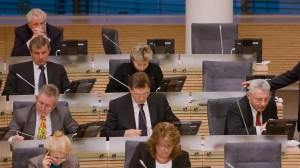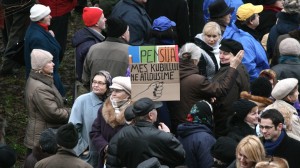
After a long week of negotiations and protests, the budget passed the Seimas two hours earlier than expected Thursday.
VILNIUS — Despite the protests outside, the Lithuania parliament passed its budget on Thursday, slashing funding for social programs while keeping the deficit below 6 percent of the gross domestic product.
The bill passed with a solid majority — 81 voted for, 56 against and 2 abstentions — after a week of political wrangling within the Seimas and thousands of protesters demonstrating without. The vote finally took place at around 5 p.m. after a lengthy discussion period. Those who voted against the budget came from both sides of the political aisle, including members from the left-wing Social Democratic Party and the conservative populist Order and Justice Party.
The cuts are steep. Investment in transportation and environmental projects was cut 30 percent, the expenditures for each ministry was cut 20 percent, and salaries throughout the government were cut by 10 percent on top of previous cuts implemented earlier this year. Meanwhile items left in the budget like 500,000 litai (€144,000) retained for the annual upkeep of the prime minister’s mansion, 12 million litai (€3.4 million) kept for keeping the half-constructed Royal Palace from falling apart, and three million litai (€868,000) allocated to pay for military aircraft is making political hay for the opposition.
Regardless, the passage of the bill was a major victory for Prime Minister Andrius Kubilius’ government, as getting the votes together was a serious test of the willingness of his shaky coalition to compromise on the tough austerity measures. Kubilius and President Dalia Grybauskaitė have been pushing larger cuts to deficit in the past weeks.
Ridas Jasiulionis, an adviser the prime minister, said that Kubilius is pleased with the shape of the final bill.
“It is a pity to cut some social expenditures, but there is an urgent need to do it,” Jasiulionis told Baltic Reports. “The budget reflects the reality of these days. We can call it mean, but it means that the economic situation is mean.”
Linas Balsys, spokesman for the president, said that Grybauskaitė is “very happy that we have finally a budget” and that “the political parties showed the necessary political will” to pass the budget.

A Lithuanian pensioner holds up an anti-Kubilius sign, which translates to "For the pension, we give Kubilius this," with an image of a clenched fist. Tuesday and Thursday saw large protests against the proposed budget cuts held outside the Seimas building. Photo by Nathan Greenhalgh.
Reactions to the budget in the Lithuanian press are largely negative, though. Lietuvas Rytas ran an article Thursday evening under the headline “Prime minister receives 2010 budget and a rope to hang himself.”
Likewise in the opposition parties. “It is a political document,” said Valentinas Mazuronis, a Seimas member of the Order and Justice Party who voted against this budget and other cost-reduction bills this week.
“On one hand, the government spent too much money for buildings of the ministry and for buying different things such as military airplanes,” Mazuronis told Baltic Reports. “On another hand, we don’t see in this budget a real plan for a revival of the economic situation in the next year. We don’t see a plan for unemployment programs.”
On Wednesday the Seimas voted to include payment reductions for pensions, unemployment, maternity leave and other welfare programs in the budget. Unemployment payments are now 650 litai (€188) per month.
Tax cuts to stimulate economy
Aside from the cuts in social expenditures, the government also voted to reduce taxes on corporate profits from 20 percent to 15 percent. Small businesses also saw a reduction down to 5 percent. The tax cuts were made in the hopes of stimulating job growth among companies that may already be hurting financially.
“There is a national agreement with businesses and unions and elderly people, and that national agreement is not to increase the tax system now,” Jasiulionis said.
But the neo-corporatist agreement between the government and special interests doesn’t mean consensus in the Seimas. Mazuronis decried the tax cuts as misguided.
“Why is it difficult to create new working places for private businesses? In this field we don’t see enough creation,” Mazuronis told Baltic Reports. He also said that “corruption” hindered the flow of money into the private sector, and that these concerns were not addressed by the Seimas.
Tough times
The cuts come after a challenging year for the Lithuania with a 14 percent unemployment rate and a GDP that has declined 19 percent. Although the budget was partly designed to stave off loans from the International Monetary Fund, some economic analysts worry that that option is inevitable given the current crisis.
“I definitely cannot say that there is a 100 percent guarantee that Lithuania will manage without the IMF in 2010,” Gitanas Nausėda, a top economist at SEB, said in an interview with the public radio station Lithuanian Radio on Thursday. “Let’s hope the country will manage to do that, but the question remains open.”












